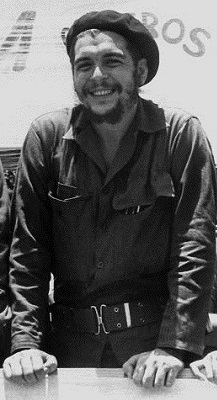|
~ Ernesto Che Guevara
~ Galéria
~ Oldal
~ Bejelentkezés
~ Vissza a Főoldalra
Ernesto Che Guevara, az argentin származású forradalmár, miniszter, gerillavezér és író, Buenos Aires-ben szerzett orvosi diplomát, majd a kubai forradalom során jelentős szerepet játszott a szigetország felszabadításában és újjáépítésében. A kubai gazdaság talpraállításáért dolgozott, küzdött az oktatás és az egészségügy fejlesztéséért, az írástudatlanság és a faji előítéletek felszámolásáért. Saját példájával népszerűsítette az önkéntes munkát. Kongóban és Bolíviában is harcolt - harminckilenc éves volt, amikor az amerikai-bolíviai csapatok csapdába ejtették és kivégezték.
| | |
|

| | |
|
|
Che's full name was Ernesto Guevara de la Serna. (Guevara was his father's surname, de la Serna was his mother's surname. He wore both in the official documents as it is a habit in Spanish-speaking countries.)
When he was a new-born baby, he was called Teté by his parents, to distinguish him from his father who wore the name Ernesto as well.
A few days later 'Teté' was changed into 'Ernestito' and his parents called him this way even if when he was a grown-up man, one of the heroes of Cuba and Latin America. (When his parents arrived at Havana after the victory of the Revolution, to meet their son after six years, they called him Ernestito which made Camilo Cienfuegos laugh hard.)
During his childhood and young years, he had several nicknames. He enjoyed shocking people and he often behaved wildly, that is why he was called 'El Loco Guevara' (meaning The Crazy Guevara). He was nicknamed 'El Furibundo Serna' or 'Fúser' (meaning furious) when he played rugby - because of his wild style of playing. One of his most famous nicknames was 'El Chancho' (meaning the Pig) because he often boasted about how rarely he bathed and washed his clothes. He even told to his friends once that "It's been 25 weeks since I washed this rugby shirt." and that he stopped wearing shorts only because they were so dirty that he had to throw them away.
When he was in Mexico and he met Cuban exiles for the first time, he made friends with one of them, Ñico López, who gave him the nickname 'Che'. The word 'Che' was widely used in Latin America to refer to Argentines. Argentine people used this word as a simple interjection (meaning "hey, you" "man") and Che used it often too.
Che loved his nicname. He said: "For me, Che represents the most essential, the most loved aspect of my own life. How could I not like it? The first and second names of a person are small things, personal, insignificant. In contrast, I like it very much when people call me Che."
He was called 'Tatu' when he was in the Congo. (Tatu means third in Swahili, referring that he was only the third person in the command.)
He was called Ramón and Fernando when he was in Bolivia. (When he worked as a dentist among the peasants and his combatants, he was called Fernando Sacamuelas - sacamuelas means tooth-puller or charlatan.) One of his fake passports was for Adolfo Mena-González.
|
|
|
|
~ Ernesto Che Guevara
~ Gallery
~ Site
~ Log in
~ Back to the Main page
Ernesto Che Guevara, the Argentine-born revolutionary, minister, guerrilla leader and writer, received his medical degree in Buenos Aires, then played an essential part in the Cuban Revolution in liberating and rebuilding the country. He did his best to set up the Cuban economy, fought for the improvement of the education and the health system, the elimination of illiteracy and racial prejudice. He promoted voluntary work by his own example. He fought in the Congo and in Bolivia - he was thirty-nine years old, when he was trapped and executed by the joint American-Bolivian forces.
| | |
|
|

